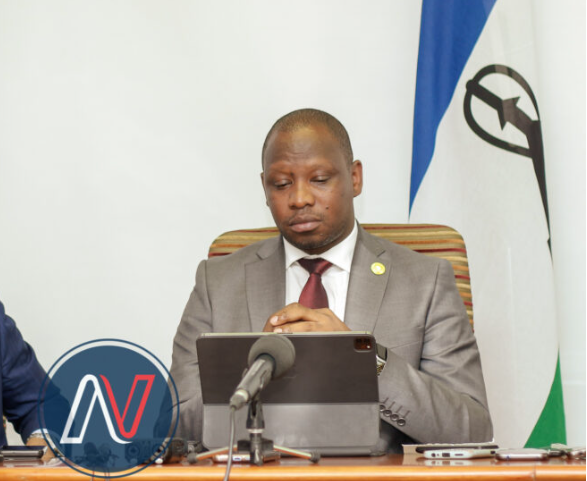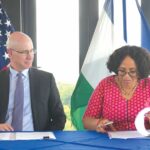Theko Tlebere
On Sunday afternoon, I quietly listened to Hon. Lejone Mpotjoane, the Minister of Foreign Affairs and International Relations, deliver a fervent keynote address at the opening of Lesotho’s Diplomatic Consultations for Heads of Missions abroad. He spoke with clarity and conviction, urging our ambassadors and high commissioners to prioritise securing more scholarships, internships, and training opportunities for Basotho.
His inspiring vision aligned with national development goals. However, as the minister outlined this ambitious plan, my thoughts drifted to Ha Khohlopo in Thaba-Tseka where my cousin stays. She graduated from a local tertiary institution three years ago with support from the National Manpower Development Secretariat (NMDS). Despite her qualifications, she remains unemployed just like thousands of other Basotho youth trapped in a stagnant labour market. Because she has not begun repaying her NMDS loan, how could she apply and get a scholarship, with no income?
She is ineligible to apply for any new scholarships, even those fully funded by foreign governments. So when I hear that our diplomats may secure 100 or even 200 scholarship opportunities, I can’t help but ask: What good are these efforts if my cousin and others like her are locked out before they even begin?
A policy that punishes the poor. In Lesotho, accessing a scholarship regardless of its source requires proof of repayment for any past NMDS loan bursary. Even if the new opportunity comes from the governments of Azerbaijan, China, or Botswana, and even if it is fully funded, applicants must have cleared their previous NMDS debt. This blanket requirement effectively bars those who are most in need and most likely to benefit from further education, Basotho from disadvantaged and unemployed backgrounds.
This policy exemplifies a systemic failure to connect foreign policy with domestic realities. The NMDS, operating under the Ministry of Development Planning, mandates that anyone previously sponsored must show “Proof of Loan Bursary repayment according to approved Loan Bursary Fund Repayment Criteria” before applying again.
This condition is a constant feature in every scholarship announcement from the recent Azerbaijan and Botswana offers to others managed through the NMDS. While the intention behind this clause may be to promote accountability and fiscal sustainability, the outcome is undeniably punitive. The irony is heartbreaking. On one hand, Lesotho is receiving goodwill from the global community in the form of scholarships meant to uplift its youth.
On the other hand, the government, through NMDS, closes the door on those same youth, demanding repayment for past assistance before they can access opportunities that come at zero cost to the state. Lesotho’s unemployment rate currently hovers at a staggering 38 percent (Bureau of Statistics, 2024). Expecting unemployed graduates to repay loans before accessing further studies, especially those sponsored internationally, is not only unrealistic, it is unjust.
Lesotho is at a critical crossroads. Its foreign policy objectives, particularly in education diplomacy, are being quietly undermined by domestic policy inconsistencies, chief among them, the outdated and rigid scholarship requirements enforced by the NMDS. During the Diplomatic Consultations, held for the first time since 2017, Minister Mpotjoane issued a bold directive to Lesotho’s Heads of Missions to elevate education diplomacy as a national priority.
His instructions were clear: secure scholarships, internships, and pathways for Basotho youth to thrive in global academic and professional spaces. The aim was noble to address skills gaps, build a globally connected workforce, and foster international cooperation. However, this enthusiasm from the Ministry of Foreign Affairs clashes sharply with NMDS’s entrenched requirements. The contradiction is stark, the Ministry of Foreign Affairs is opening doors while NMDS is quietly shutting them.
Consider two recent examples: the 2025/2026 scholarship offers from the Republic of Azerbaijan and the University of Botswana. Both countries extended generous, fully funded opportunities to Basotho citizens across a spectrum of academic programs. These scholarships are designed to improve bilateral ties, human capital development, and knowledge exchange.
Yet, in both calls for applications, NMDS imposed its standard repayment clause: previous beneficiaries must submit proof of loan repayment to be considered. This effectively disqualifies a significant number of applicants those who may have completed their studies but remain unemployed or underemployed. These scholarships, meant to be lifelines, are rendered ineffective by a policy that equates opportunity with financial status. Worse still, it fails to differentiate between a government-funded bursary and a foreign-funded scholarship that places no burden on Lesotho’s public finances.
Originally, the NMDS loan bursary scheme was introduced to widen access to higher education. The repayment model made sense on paper: study now, repay later when gainfully employed. But in practice, the model has turned into a trap. Instead of being a bridge to opportunity, it has become a gatekeeper. Why should a student who benefited from a modest NMDS bursary five years ago be barred from applying for an Azerbaijani or Chinese scholarship today simply because they haven’t secured employment? Such rigidity doesn’t just hinder access, it entrenches inequality. This is a broader issue of access and justice. It penalises those who are already marginalised and cements education as a privilege rather than a right supported by the laws in Lesotho.
The disconnection between Lesotho’s foreign policy and its scholarship management reflects a deeper institutional problem. The Ministry of Foreign Affairs is actively securing opportunities through diplomacy, while NMDS remains rigid and outdated in its implementation of scholarship policy.
Without synergy between these two ministries, even the most well-intentioned international partnerships will fail to deliver results. Minister Mpotjoane’s directive to Heads of Missions is commendable, but it will not translate into real change until NMDS recalibrates its approach.
If Lesotho is to fully benefit from its international diplomacy efforts, especially in the education sector, the following reforms are necessary:
Policy Differentiation: NMDS MUST DISTINGUISH BETWEEN FOREIGN-FUNDED SCHOLARSHIPS AND LESOTHO-FUNDED BURSARIES. SCHOLARSHIPS FROM EXTERNAL PARTNERS SHOULD NOT BE CONTINGENT ON NMDS LOAN REPAYMENT.
Grace Periods and Flexibility: For applicants with outstanding NMDS debts, there should be deferment options or income-contingent repayment plans, especially for unemployed graduates.
Cross-Ministerial Collaboration: The Ministries of Foreign Affairs and Development Planning must work closely together to ensure that diplomatic wins are accessible to the public.
Transparency and Awareness: Eligibility requirements must be clear, fair, and well-publicised. Vague phrases like “application does not guarantee award” must be re-examined and clarified.
Data-Driven Policy Design: The government should invest in tracking scholarship beneficiaries, employment outcomes, and repayment rates to inform responsive and equitable policy.
People-Centred Design: Scholarship policies must reflect the socio-economic realities of Basotho and prioritise merit over financial status.
When I think of my cousin in Ha Khohlopo intelligent, hopeful, and ready to contribute, I see a generation of Basotho blocked not by a lack of opportunity, but by institutional design. We say we want to uplift our people, yet we maintain systems that exclude them. Minister Mpotjoane, your efforts in mobilising global opportunities for Basotho are truly commendable. But your vision cannot be realised if the policies at NMDS remain unchallenged. Lesotho doesn’t need just more scholarships—it needs access to those scholarships. Access starts with reform. Until we reconcile domestic policy with foreign opportunities, the scholarships our diplomats secure will remain nothing more than distant promises to those who need them most. The future is NOW!
Summary
- This condition is a constant feature in every scholarship announcement from the recent Azerbaijan and Botswana offers to others managed through the NMDS.
- The government, through NMDS, closes the door on those same youth, demanding repayment for past assistance before they can access opportunities that come at zero cost to the state.
- During the Diplomatic Consultations, held for the first time since 2017, Minister Mpotjoane issued a bold directive to Lesotho’s Heads of Missions to elevate education diplomacy as a national priority.

Your Trusted Source for News and Insights in Lesotho!
At Newsday Media, we are passionate about delivering accurate, timely, and engaging news and multimedia content to our diverse audience. Founded with the vision of revolutionizing the media landscape in Lesotho, we have grown into a leading hybrid media company that blends traditional journalism with innovative digital platforms.







